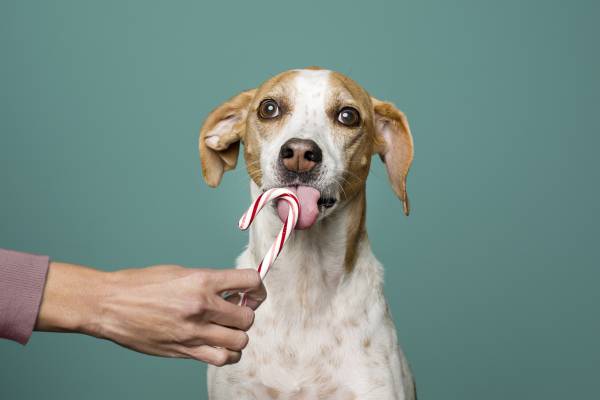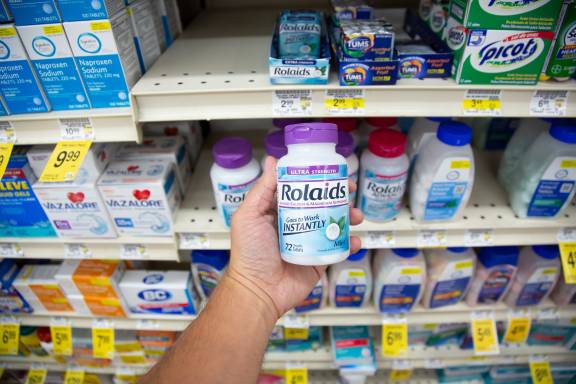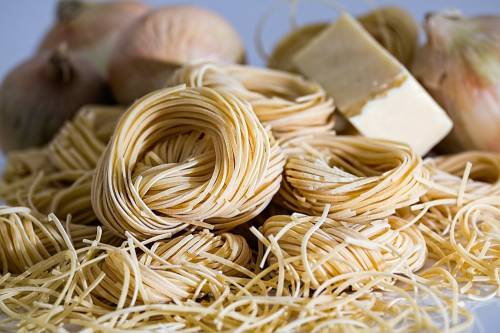Connect with a verified veterinarian in minutes. Licensed vets are available 24/7 to answer your questions. No need to worry about your furry family member.
Don’t you just love the holidays? The tree’s up in the room, with lights twinkling and the fireplace going in the background. There may be snow outside, but inside it’s all nice a warm. What a cozy picture is that! However, while you were admiring the coziness of the room, your dog decided to go for a candy cane on the tree! Oh no! Now what?
First, don’t panic. We’ll walk through this and see what needs to take place.
Are Candy Canes Toxic to Dogs?
The answer is it depends on the ingredients in the candy cane. Some candy canes are made of normal sugar, while others are made with an artificial sweetener called xylitol. Depending on how much they eat of it, xylitol can be extremely toxic to dogs.
So, before calling the vet, see if you can find the packaging for the candy canes. Then, check the ingredient list for sugar or xylitol.
If your dog has eaten one candy cane that contains natural sugar (and no xylitol) he should be OK, but this can depend on the size of your dog. He may have an upset stomach, vomiting, and diarrhea; however, these should pass. In these cases, it is still important to phone your vet for individual advice for your dog based on his size and weight.
On the other hand, if your fur baby has eaten a candy cane that contains xylitol, then you’ll need to phone your veterinary clinic immediately, as your pet may need urgent veterinary attention.
Can Sugar Canes Cause Other Issues for Dogs?
That’s a great question, and the answer is yes! Not only can the candy cane ingredients be bad for your dogbut thehe wrapper can also be harmful.If your pet swallows the wrapper there is a risk of it causing choking.
A swallowed candy cane wrapper also has a risk of causing intestinal blockage, where it can get stuck in your pet’s digestive system (stomach). Intestinal blockage can be very harmful for your pet, so it is important to contact your veterinarian if you suspect your pet may have eaten a candy cane wrapper.
What else could be wrong with giving my dog a candy cane? There is another problem. Candy canes are very smooth until they’re broken or chewed. When dogs chew on a candy cane, very fine, sharp pieces can come off the candy cane. These can cause lacerations in the mouth, tear the esophagus, and more. Chewing on a candy cane could also break your dog’s teeth.
While candy canes seem harmless for dogs, it’s really not the case. Candy canes can be dangerous to your dog and other pets. So, if you’d like to have candy canes for the holidays, be sure not to put any on the tree. Keep them in a bowl, out of your dog’s reach. And when you’d like to enjoy that sweet treat, have a dog-friendly treat ready for your fur baby, too!
Connect with a verified veterinarian in minutes. Licensed vets are available 24/7 to answer your questions. No need to worry about your furry family member.

Evie Moloney, RCVS
This article has been reviewed and approved by an independent Veterinarian: Evie is a vet surgeon who graduated from the University College Dublin, which is the only university offering the veterinary medicine degree in Ireland. She really enjoys surgery and has also worked as an emergency and critical care vet. She is passionate about sharing education about preventative health care for pets, especially the importance of regular dog and cat teeth brushing at home. She also enjoys helping owners find practical solutions for keeping pets as comfortable as possible while living with conditions such as arthritis. When not working, she enjoys hiking and swimming.
Review symptoms, medications & behavior to keep your pets healthy with a Vet Online in just minutes.
Ask a Vet Live Now






